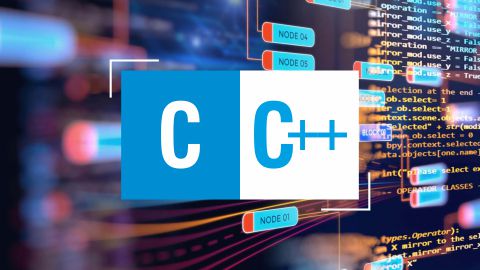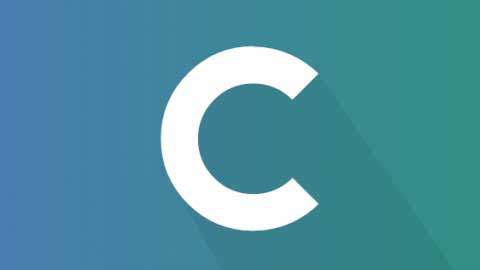Are you a beginner-level programmer? do you want to learn basic but essential programming concepts? then enroll in our online refresher course C, which contains many vital concepts of C programming. In one week you will get familiarised with unbeatable concepts of C programming. You will get a quiz to master your understanding and enhance your smartness with this programming skill. There are interactive but small video tutorials. That is completely easy to understand by a beginner-level student as well. So, if you want to learn the C language and willing to get an admission refresher course. Then this is the right place where you can put your efforts to get extensive but quality information.
What you will learn in this online refresher course in C?
You will understand the real-world programs and also understand how to write these effectively.
This short course but covers a lot more things. That you can learn in this course only and apply it in your professional life to give a great impact on management.
You will master the clubbed and reinforce concepts that will boost up your skillset.
If you want to learn the modern but basic concepts of C programming, then you can simply enroll in this course.
Course Content
-
What is C?
-
C Character Set
-
Constants, Variables and Keywords
-
Types of C Constants
-
Rules for Constructing Integer Constants
-
Rules for Constructing Real Constants
-
Rules for Constructing Character Constants
-
Types of C Variables
-
Rules for Constructing Variable Names
-
C Keywords
-
First C Program
-
Compilation and Execution
-
Receiving Input
-
C Instructions
-
Type Declaration Instruction
-
Arithmetic Instruction
-
Integer and Float Conversions
-
Type Conversion in Assignments
-
Hierarchy of Operations
-
Associativity of Operators
-
Control Instructions in C
-
Exercise
-
Decisions! Decisions!
-
The if Statement
-
The Real Thing
-
Multiple Statements within if
-
The if-else Statement
-
Nested if-elses
-
Forms of if
-
Use of Logical Operators
-
The else if Clause
-
The ! Operator
-
Hierarchy of Operators Revisited
-
A Word of Caution
-
The Conditional Operators
-
Exercise
-
Loops
-
The while Loop
-
Tips and Traps
-
More Operators
-
The for Loop
-
Nesting of Loops
-
Multiple Initializations in the for Loop
-
The Odd Loop
-
The break Statement
-
The continue Statement
-
The do-while Loop
-
Exercise
-
Decisions Using switch
-
The Tips and Traps
-
switch Versus if-else Ladder
-
The goto Keyword
-
Exercise
-
What is a Function
-
Why Use Functions
-
Passing Values between Functions
-
Scope Rule of Functions
-
Calling Convention
-
One Dicey Issue
-
Advanced Features of Functions
-
Function Declaration and Prototypes
-
Call by Value and Call by Reference
-
An Introduction to Pointers
-
Pointer Notation
-
Back to Function Calls
-
Conclusions
-
Recursion
-
Recursion and Stack
-
Adding Functions to the Library
-
Exercise
-
Integers, long and short
-
Integers, signed and unsigned
-
Chars, signed and unsigned
-
Floats and Doubles
-
A Few More Issues…
-
Storage Classes in C
-
Automatic Storage Class
-
Register Storage Class
-
Static Storage Class
-
External Storage Class
-
Which to Use When
-
Exercise
-
Features of C Preprocessor
-
Macro Expansion
-
Macros with Arguments
-
Macros versus Functions
-
File Inclusion
-
Conditional Compilation
-
#if and #elif Directives
-
Miscellaneous Directives
-
#undef Directive
-
#pragma Directive
-
Exercise
-
What are Arrays
-
A Simple Program Using Array
-
More on Arrays
-
Array Initialization
-
Bounds Checking
-
Passing Array Elements to a Function
-
Pointers and Arrays
-
Passing an Entire Array to a Function
-
The Real Thing
-
Two Dimensional Arrays
-
Initializing a 2-Dimensional Array
-
Memory Map of a 2-Dimensional Array
-
Pointers and 2-Dimensional Arrays
-
Pointer to an Array
-
Passing 2-D array to a Function
-
Array of Pointers
-
Three Dimensional Array
-
Exercise
-
What are Strings
-
More about Strings
-
Pointers and Strings
-
Standard Library String Functions
-
strlen( )
-
strcpy( )
-
strcat( )
-
strcmp( )
-
Two-Dimensional Array of Characters
-
Array of Pointers to Strings
-
Limitation of Array of Pointers to Strings
-
Solution
-
Exercise
-
Why Use Structures
-
Declaring a Structure
-
Accessing Structure Elements
-
How Structure Elements are Stored
-
Array of Structures
-
Additional Features of Structures
-
Uses of Structures
-
Exercise
-
Types of I/O
-
Console I/O Functions
-
Formatted Console I/O Functions
-
sprintf( ) and sscanf( ) Functions
-
Unformatted Console I/O Functions
-
Exercise
-
Data Organization
-
File Operations
-
Opening a File
-
Reading from a File
-
Trouble in Opening a File
-
Closing the File
-
Counting Characters, Tabs, Spaces, …
-
A File-copy Program
-
Writing to a File
-
File Opening Modes
-
String (line) I/O in Files
-
The Awkward Newline
-
Record I/O in Files
-
Text Files and Binary Files
-
Record I/O Revisited
-
Database Management
-
Low Level Disk I/O
-
A Low Level File-copy Program
-
I/O Under Windows
-
Exercise
-
Using argc and argv
-
Detecting Errors in Reading/Writing
-
Standard I/O Devices
-
I/O Redirection
-
Redirecting the Output
-
Redirecting the Input
-
Both Ways at Once
-
Exercise
-
Bitwise Operators
-
One’s Complement Operator
-
Right Shift Operator
-
Left Shift Operator
-
Bitwise AND Operator
-
Bitwise OR Operator
-
Bitwise XOR Operator
-
The showbits( ) Function
-
Exercise
-
Enumerated Data Type
-
Uses of Enumerated Data Type
-
Renaming Data Types with typedef
-
Typecasting
-
Bit Fields
-
Pointers to Functions
-
Functions Returning Pointers
-
Functions with Variable Number of Arguments
-
Unions
-
Union of Structures
-
Exercise
-
Which Windows…
-
Integers
-
The Use of typedef
-
Pointers in the 32-bit World
-
Memory Management
-
Device Access
-
DOS Programming Model
-
Event Driven Model
-
Windows Programming, a Closer Look
-
The First Windows Program
-
Hungarian Notation
-
Exercise
-
Windows Programming
-
The Role of a Message Box
-
Here Comes the window…
-
More Windows
-
A Real-World Window
-
Creation and Displaying of Window
-
Interaction with Window
-
Reacting to Messages
-
Program Instances
-
Exercise
-
Graphics as of Now
-
Device Independent Drawing
-
Hello Windows
-
Drawing Shapes
-
Types of Pens
-
Types of Brushes
-
Code and Resources
-
Freehand Drawing, the Paintbrush Style
-
Capturing the Mouse
-
Device Context, a Closer Look
-
Displaying a Bitmap
-
Animation at Work
-
WM_CREATE and OnCreate( )
-
WM_TIMER and OnTimer( )
-
A Few More Points…
-
Windows, the Endless World…
-
Exercise
-
Hardware Interaction
-
Hardware Interaction, DOS Perspective
-
Hardware Interaction, Windows Perspective
-
Communication with Storage Devices
-
The ReadSector( ) Function
-
Accessing Other Storage Devices
-
Communication with Keyboard
-
Dynamic Linking
-
Windows Hooks
-
Caps Locked, Permanently
-
Did You Press It TTwwiiccee……
-
Mangling Keys
-
KeyLogger
-
Where is This Leading
-
Exercise
-
What is Linux
-
C Programming Under Linux
-
The ‘Hello Linux’ Program
-
Processes
-
Parent and Child Processes
-
More Processes
-
Zombies and Orphans
-
One Interesting Fact
-
Exercise
-
Communication using Signals
-
Handling Multiple Signals
-
Registering a Common Handler
-
Blocking Signals
-
Event Driven Programming
-
Where Do You Go From Here
-
Exercise


